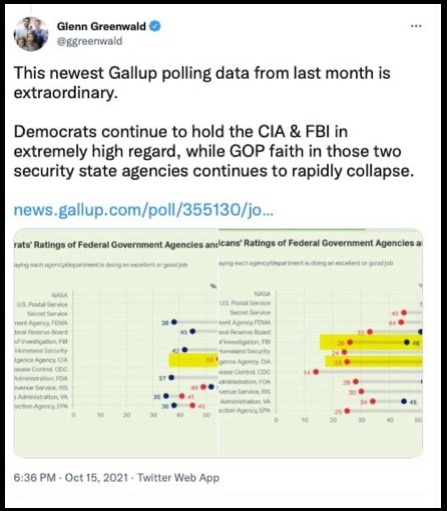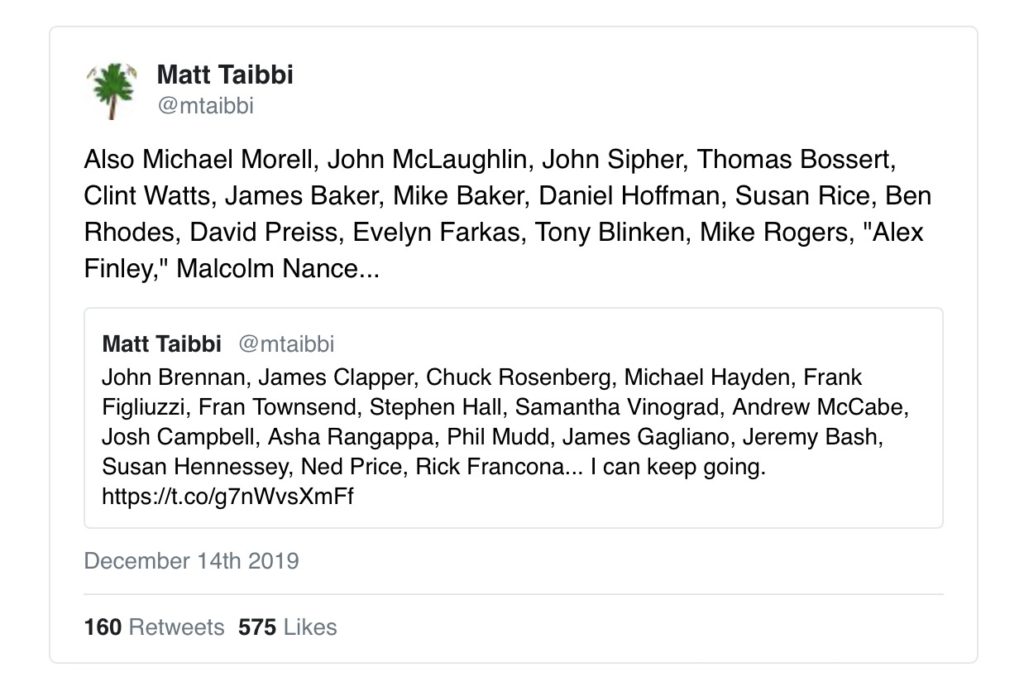A New Well-Documented Love Story: Democrats and America’s Spy State
Two related things of note. First, Glenn Greenwald notes that Democrats are falling in love with America's Deep State:
What the fuck is happening to Democrats? We have tons of recent evidence telling us that the deep state exists and that it comprises anti-democratic poison coursing through our country's arteries.
Six or seven years ago, “Deep State” was a term you would only see in left-leaning media. Bill Moyers explored the theme on his site from time to time, and when The Nation asked Edward Snowden about it, he said, “There’s definitely a deep state. Trust me, I’ve been there.”If this is not enough to make you cry a river, Taibbi reminds us that the liberal news media is infested with spooks:The “deep state” was on the liberal left’s front burner then because a spate of horrendously ugly revelations put it there. We learned via Snowden that the NSA was collecting the communications of people all around the world in secret (Carollo might want to mark down that congress wasn’t informed) in a program the U.S. Court of Appeals just last year declared illegal.
We found out top intelligence officials like CIA chief John Brennan and Director of National Intelligence James Clapper lied to congress, among other things about the warrantless surveillance program, and got away without perjury charges despite a furious outcry from legislators (another useful factoid for Carollo, on the oversight front). We learned about the CIA’s systematic use of torture techniques, ranging from anal feeding to threatening to rape and murder relatives to induced hypothermia, another fun set of pastimes the agency decided not to burden congress with knowledge of. . . . Pre-Trump, all of this spoke to the worst nightmares of American liberalism. Millions of Boomers and Gen-Exers alike had grown up worshipping at the altar of Miranda and Mapp v. Ohio, believing the ideas of due process and transparency inviolable. . . .
Young or not, the average commentator now is both committed to forgetting the sordid history of agencies like the CIA, and perfectly equipped mentally to keep that commitment. . . .
Then Trump arrived. Almost immediately, it was obvious his historical destiny was to be the best thing that ever happened to the secret services. In the same way hydroxychloroquine became snake oil the instant Trump said he was taking it, the “Deep State” became a myth the moment Trump and his minions started talking about it. Deep state warriors like Brennan, Clapper, and former CIA chief Michael Hayden, held in near-universal disdain before as some of the world’s most loathsome people, people so morally ugly it showed on their hideous faces, became immediately respectable by rebranding themselves as Trump critics. The early Trump years, in fact, made heroes of every tumescent peeping-Tom creep and spook in the federal register, now cast in the press as democracy’s infantry, saving the world through intercepts, informants, and leaks.
In a flash, programs that terrified American liberals previously, like FISA, became weapons of Holy War, in the ongoing campaign to Oust Trump via a succession of investigations and impeachment bids. When it came out that a known FBI informant spied on presidential candidate Trump, pundits not only cheered, they refused outright to call it spying.
. . . .
The cultural memories of the coming wave of media professionals extend back a few years at most. Most have read thousands more tweets than book pages. Their opinions come mainly from the dung-pile of popular news and are in sync with most Democrats, whom polls consistently show to have strong majority favorable views of the CIA and the FBI, a dramatic turnaround from the pre-Trump years. In fact, now that the War on Terror has ostensibly been reconfigured to target gun owners, white supremacists, and “insurrectionists,” they can scarcely remember why they ever felt negatively about the NSA or the folks at Langley, which of course makes them perfect for their jobs. In a dystopia, a good memory is just an inconvenience.
Now, just like any other tinpot third-world country, we get our news directly from secret agents. I made a list once:


